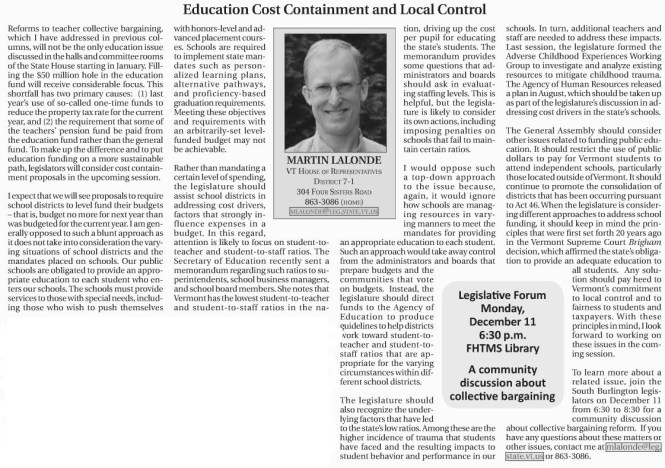
education
No Change for Date of School Budget Votes
Among his proposals, the Governor in his budget sought to transfer the cost of childcare, higher education, and part of the cost of teacher’s retirement to the Education Fund. He proposed adding $135.9 Million dollars of costs into the Education Fund and increasing the General Fund Transfer to the Education Fund by $86 Million leaving a difference of roughly $50 million dollars. To make up the difference he proposed that school boards go back and level fund their budgets. This proposal comes late in the game and would, as he proposed, require postponing to May 23rd the date on which communities vote on school budgets. On Friday, an amendment to a bill came before the House that would have changed the date of budget votes to May 23rd. The Houser rejected the amendment on a vote of 87 to 47.
The following is a statement that I made during the debate on the amendment:
South Burlington School administrators started work on this year’s school budget back in September. The School Board had its first meeting regarding the budget at the end of September. Work continued on the budget into January. Administrators and the Board put in many hours to ensure that we had a budget that would fulfill the ends of our District. A budget that would ensure that our students are ready for college, careers, or their next steps in life at a cost that the community will support.
Our costs are going up. We have seen increased needs of students who are walking through our doors. We are obligated to provide an appropriate education for all of these students. Our special education costs are going up and our costs to implement state mandates are rising. It took significant time and effort to come up with a budget that meets these needs.
Administrators and school boards should not have to spend another three months of valuable time to redo budgets, to undo the significant work they have accomplished. There are too many other important priorities on which time and energy should be spent to ensure that our public schools continue to be one of the major attractions of our community.
Two other reasons why I am against this amendment. First, to level fund a budget, we in South Burlington would undoubtably have to cut significant numbers of teachers and staff. But we are obligated to provide notices of reductions in force by late March. We are obligated to have all contracts signed with teachers by May first. A budget vote on May 23rd would be beyond these deadlines. Even if those deadlines were removed, problems would be presented. We need to provide notice to teachers on whether they will be employed at our school next year soon. If they are not coming back, they need the time to find new positions.
If we are to significantly change how we are funding our schools, this body needs to be very deliberate and careful. We should tread lightly when dealing with this most important asset of Vermont.
Limits on Education Spending Growth
Restructuring School Districts
Op Ed and Other Media Related to Bill to Ban Strikes and Imposition
Aki Soga, the Burlington Free Press Editorial Page editor, wrote an Op Ed article on the unsuccessful attempt in the legislature to ban teacher strikes. He concluded that “[a]nyone who sees in the defeat of the strike ban provision only an affirmation of the status quo lacks the vision to be a leader in education in Vermont.”
Also, I had the opportunity last week to discuss the vote on my amendment to ban teachers strikes and school board impositions in “Under the Golden Dome,” a program produced weekly during the legislative session. You can watch the video here. My clip is toward the end of the video.
Finally, here is a link to a post-mortem on the issue that appeared on the Seven Days web site.
Education Reform
Reporting out an amendment to prohibit strikes and imposition
The following is the script that I used in reporting out an amendment today to prohibit strikes and imposition and to form a task force for considering further changes to collective bargaining. I ad libbed a bit, but this captures most of my talk. Here is a link to the House Journal for the day. My amendment starts at page 980. The amendment was defeated 73-70. Here is a link to an article on the issue in the Burlington Free Press.
*************
My experience as a member of the South Burlington School Board informs my view point on this amendment, which I have cosponsored.
A little over four years ago, the South Burlington School Board voted to impose contract terms on the district’s teachers. As a member of the Board, I voted against imposition. I won’t go into the details of my reasoning, but I believed that in order to justify imposing contract terms a school board had to have no other choice. Given the turmoil imposition causes, it should be used rarely, if at all. There are other options.
Many of the community members the Board heard from during that time four years ago agreed and said it better than I can.
One community member wrote the following:
“The members of the school board and the teachers taking on negotiations have an opportunity to model to our children that when things get tough, it is best to sit down and talk it out. Teachers often say, “Use your words.” Please practice this. Sit down and talk some more and if that doesn’t work . . . get creative by sharing more ideas.”
Another community member said the following:
“The faculty in your schools spend their days teaching, among many other things, children to have discussions when they have problems with each other. They work with students so they develop skills to be able to sit down and talk things out. What a poor, poor example you are setting for the youth in South Burlington.”
And another:
“By imposing a contract on the South Burlington teachers you are sending a message to our community that you are unwilling to communicate and work towards a mutually acceptable resolution to the current labor and budget crisis.”
Many other community members made similar points. I think they are correct. There are other ways to resolve disputes between teachers and school boards that don’t involve imposition or the threat of imposition.
At the same time, there are other ways to resolve disputes between teachers and school boards that don’t involve strikes or the threat of strikes.
This past fall South Burlington endured a five-day strike before settling a contract. We heard similar input from the community then.
The following message was sent to both the teacher’s Association and the School Board:
“I plead with you, please find a way to seek a reasonable, logical, sustainable contract negotiation that keeps our children the main focus and for our community members who are raising them. We personally are prepared to wait however long that may take.”
Another community member said the following:
“I can’t help but wonder what the poor behavior and negotiation tactics are teaching our youth. They certainly are watching and learning. Is it okay to push around another group of people? Is it okay to threaten others? To storm out if you don’t get your way?”
We also received many emails and comments from individuals expressing the emotional impact the strike had on them and their children, and the bitterness and enmity that it caused.
In the end, what did the strike accomplish? It definitely caused a serious drop in community support for the district’s teachers. I and other school board members heard from many individuals who expressed their anger, not at the board, but at the teachers.
What else did the strike accomplish? Before the strike, the board had a proposal on the table that provided a bit over 7% in new money over three years. After the strike, the teachers had managed to raise this figure to a bit over 8%. The enmity of the community for a one percent gain over three years.
Last fall was not the first teachers’ strike that I have lived through. My father was a teacher and a member of the Michigan Educators Association, part of the NEA. He was in a leadership position and was the spokesperson for the Union when it struck back in 1970. Unlike today, that was a time when teachers made far less than the median income in the communities in which they worked. The strike did improve that situation. But the cost was great. As my mom has told me, for years afterwards people would avoid her in town because her husband had gone on strike. It took years for the community to recover.
This bill, H.76, wisely eliminates both the right of school boards to impose contract terms and the right of teachers to strike.
By doing so, it would improve the collective bargaining process. It will require the parties to engage in meaningful dialogue. Currently, with the threat of imposition and strike, too often the parties talk past each other or don’t talk at all. Instead of compromise, the parties cling to their positions and brandish their threats of imposition or strike. The Board has the incentive to say, if we don’t get our way, we will impose. The teachers have the incentive to say, if we don’t get our way, we will strike. That mind set needs to be changed, and this amendment does that.
I have spoken about my experiences in South Burlington. But I have had the opportunity to speak to many other school board members from across the state, and they share this view. The threat of strikes and imposition are not productive and, indeed, impeded compromise.
So, at Section 1 of the bill, we find the heart of the matter – strikes and imposition shall be prohibited. The Effective Dates provision of the bill, Section 5, provides that the prohibition on strikes and imposition applies to negotiations beginning on or after July 1, 2016.
Sections 2 and 3 of the bill repeal two provisions that with the prohibition on strikes and contract imposition would cause the statute to become internally inconsistent.
Section 4 establishes a task force on dispute resolution in labor relations for teachers and administrators and requires a report from the task force. It is in section 4 that the changes from the amendment in the calendar appear. I’ll point those out momentarily.
This section replaces the dispute resolution mechanism that was in the amended bill voted out from the education committee. It represents the primary change to what the education committee passed out of committee and what the House General committee has considered.
The education committee felt that the dispute resolution mechanism was appropriate. Also, testimony was provided in House General from labor lawyers who said that the mechanism would work. Nevertheless, members of House General had serious and legitimate reservations about the mechanism. Accordingly, this amendment establishes a task force to consider further the rules for teacher collective bargaining when strikes and imposition are prohibited.
Let me note here that 38 states prohibit teacher strikes. All of the New England states with the exception of Vermont prohibit strikes. The vast majority of New England states are able to reach timely settlements without strikes or imposition being an option. With few exceptions, these states are doing fine and are reaching finality in contract negotiations. Indeed, all but one of these states are paying their teachers higher wages than in Vermont, despite those teachers not having the right to strike.
This amendment allows additional consideration of what is and is not working with these states. And the fact that strikes and imposition would be prohibited as of July 2016 would add incentive for the task force to come back with a timely, thorough analysis.
One might ask, but what if we can’t come up with a new way to get to finality? I submit that the current collective bargaining system would work fine, even without the right to strike or impose. Under current law, the parties may mediate, go to fact finding, or even agree to binding arbitration. If the system stays the same except for the elimination of strikes and imposition, it will still be an improvement that should lead to more creative problem solving at the negotiating table. It is better than having the end game of negotiations be a strike or contract imposition.
Let me point out one change from the amendment as it appears in the calendar. The amendment did not allow the task force to consider mandatory binding arbitration as an option. We wanted the task force to focus on finding a solution that does not entail binding arbitration. Given concerns that we heard expressed, we have struck the language that prohibited consideration of binding arbitration.
End of Section 4 (a) and (c)
I note that only one New England state mandates binding arbitration.
My opposition to binding arbitration is that it is fundamentally undemocratic. It puts in the hands of an unaccountable third party, rather than the elected school Board, decisions related to 80% of a school’s budget. It puts in the hands of an unelected third party the decision that will impact the property taxes that the community must pay for education. The third party would have no fiscal responsibility or accountability to the community, nor would he or she necessarily be familiar with community issues. That is not a solution that the legislature should support.
In addition, binding arbitration is not a means to find the creative, cooperative solutions that we now need to find through the negotiations process. We are facing continued spending pressures in education, particularly now with the cap put in place H.361. We are facing rising health care costs. With binding arbitration, school boards and the teachers association will not have the incentive to find creative ways to address the rising costs of health care, or to address increasingly difficult funding issues.
Having said that, the amendment does not preclude consideration of mandatory binding arbitration.
Walk through Section 4
Section 4(a) creates the task force.
Section 4(b) establishes the membership of the task force – representatives of the Vermont NEA and the Vermont School Boards Association. Here is where there is another change from the amendment in the calendar. Rather than having the Executive Director of the Vermont Labor Relations Board on the task force, section (b)(5) provides that the VLRB will appoint an individual with labor relations experience as chair of the task force.
Section 4(c) charges the task force with evaluating possible statutory changes to improve the process for resolving a dispute or impasse during teacher or administrator labor negotiations. It establishes what the task force should consider.
Section 4(d) provides that the task force has to consult certain other interested parties.
What was previously Section 4(e) in the calendar version has been struck.
The new Section 4(e), previously 4(f), provides that on or before November 15, 2015, the task force shall submit a report to certain House and Senate committees.
Section 4(f) provides certain rules regarding meetings of the task force. Here, again the amendment on your desk modifies this provision.
In Summary, eliminating strikes and imposition will
* Avoid the adverse impacts to a community, to schools, and to children who would otherwise have to go through a future strike or imposition.
* Improve the negotiations process by taking away the threat of strikes and imposition, which discourage compromise.
Education, Water, Infrastructure and More
In the past week, the House debated and passed a major education reform bill (H.361), a water clean-up bill (H.35), and the capital bill (H.492).
I voted yes on the education bill even though, as a school board member, I had some major concerns with aspects of it, particularly the inclusion of a cap on local school spending. In my next article in The Other Paper, which comes out this Thursday, I will be addressing this issue more fully (stay tuned). In the interim, a couple good articles about the cap can be found in VTDigger and the Burlington Free Press. Also, the Vermont School Board Association published an extensive analysis of the bill as passed. And take a look at the write-up of the Vermont League of City and Towns for an alternative view of the bill.
I also voted for the water bill, which was less controversial than the education bill. Its detractors were concerned about impacts to small farms and the funding mechanism for the cleanup, but the concerns could not turn back the momentum that was behind this important bill. The bill would raise $8 million in new revenue, including $2.3 million in fee increases to be paid by farms and others contributing to the pollution entering the State’s waters. It would also add a .2% surcharge on the property transfer tax. H.35 takes a large step on what will be a long journey to clean State waters, including Lake Champlain. For more information, see my prior blog posts about the water bill and this VTDigger article.
Finally, I also voted for the capital bill, which funds State infrastructure projects over the next two years through issuing long-term bonds. Among other priorities, the bill provides $7.6 million dollars over two years to the Vermont Housing Conservation Board, with at least $1.5 million of that amount to be used for statewide water quality improvements in FY16 and another $1 million in FY17. The Committee on Corrections and Institutions, which works on this bill, recognizes that it is essential that the State address the water quality issue before the EPA mandates a solution, which could mean a more expensive and less effective approach to the cleanup of the waters of the State.
The only controversial part of the bill was a provision that a fair wage be provided to Vermonters working on projects that the Department of Buildings and General Services (“BGS”) oversees. Payment of a fair wage, which is referred to as the Davis-Bacon Prevailing Wage after the federal law that established it, is already required when Vermont is paying for part of a project that also includes federal dollars. This new provision addresses all projects undertaken by BGS.
I, along with the rest of the House, spent most of the time over the past two weeks on the House floor taking up the budget and revenue bills last week and the bills discussed above this past week. Still, some work was accomplished in committees.
The House Judiciary Committee continued to take testimony on H.221, relating to criminal justice reform. Although supporting the general concept of seeking to decrease incarceration rates in Vermont, representatives from the Attorney General’s Office, the Court, and the Department of State’s Attorneys and Sheriffs’ Association expressed concerns over some of the ways the bill seeks to accomplish that end. The Vermonters for Criminal Justice Reform, headed by former House Representative Susan Wizowaty, is working with these agencies to offer language that addresses their concerns.
In addition, S.115, relating to expungement, should be on the House floor next week. This bill allows for wiping from the record convictions that were based on conduct that has been decriminalized, such as convictions for possession of marijuana in an amount that is no longer criminal. House Judiciary added a section to the bill that provides an alternative avenue for expungement of crimes committed by an individual who was 25 years old or younger at the time of the qualifying offense. Under this provision a person can petition for expungement 5 years (as opposed to 10 to 20 years) after satisfying the terms and conditions of his or her conviction and successfully completing a term of public service programming as approved by the Community Justice Network. In addition, the individual has to have paid any restitution order of the Court and cannot have been convicted of a later crime. The Court also must find that the expungement serves the interest of justice. This new language would help reduce the collateral consequences of conviction, which is one of the aims of H.221 discussed above.
In the coming week, Judiciary will be focusing on S.141, relating to possession of firearms, which just passed the Senate. After a thorough walk-through from Legislative Council Counsel, Judiciary started taking testimony during breaks from the floor over the past week. The bill would restrict gun ownership for violent felons and individuals with certain mental illnesses who are a danger to themselves and others. It also provides a procedure for individuals who had suffered a mental illness to regain the right to gun ownership. I have already been receiving many emails that weigh in on this bill.



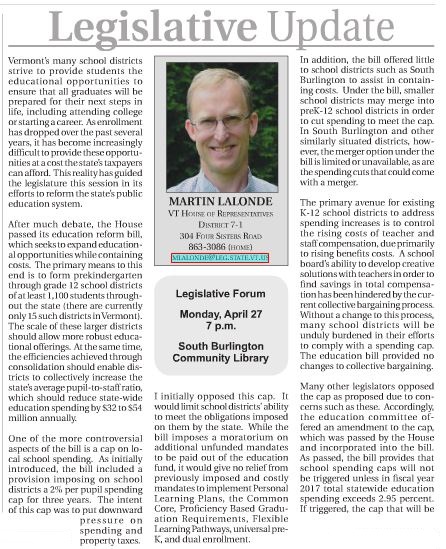
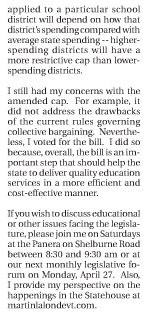

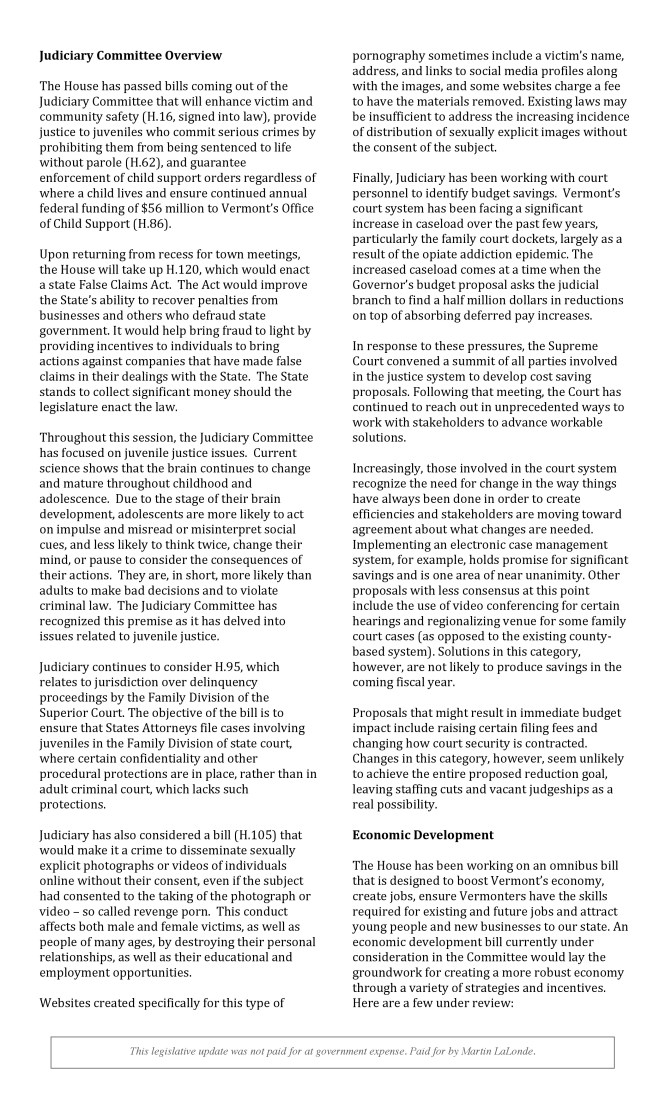
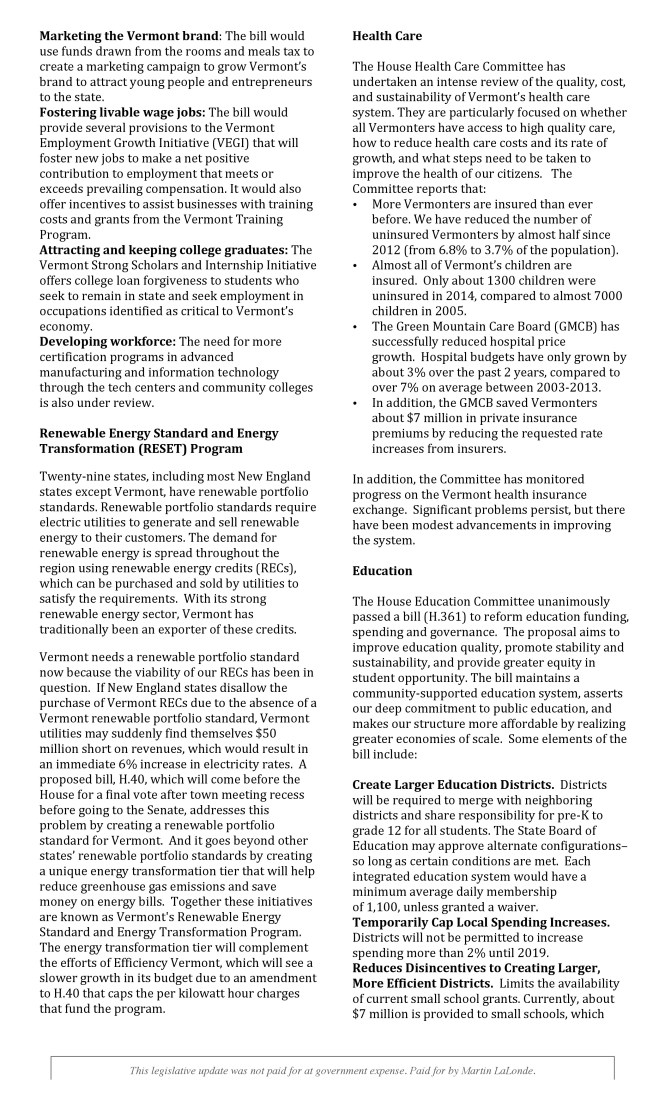
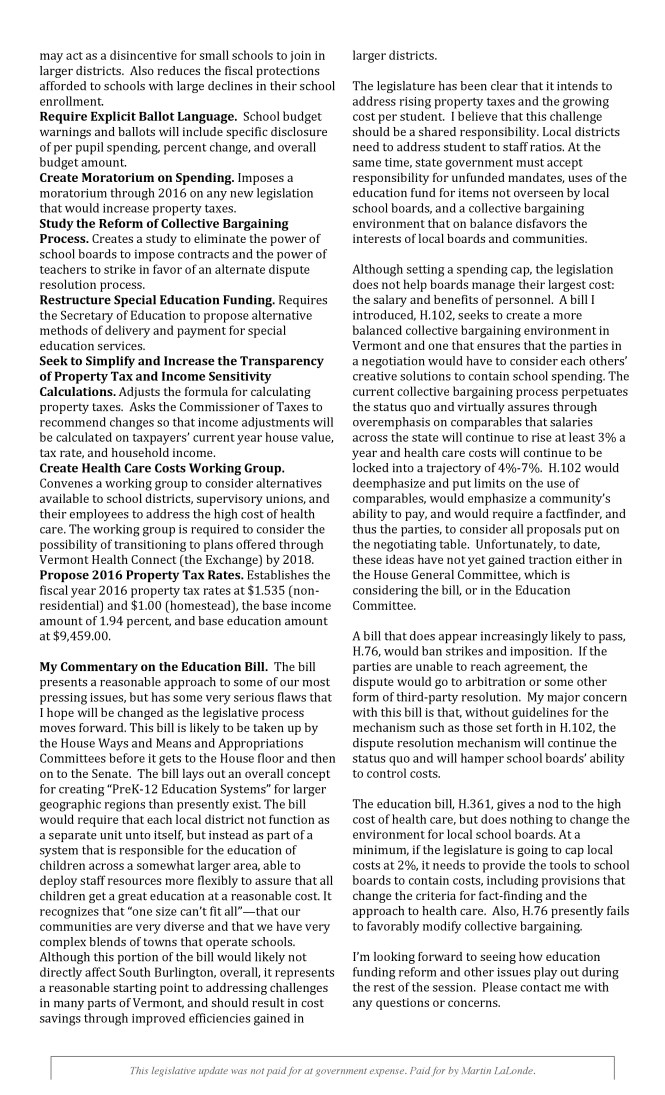

You must be logged in to post a comment.